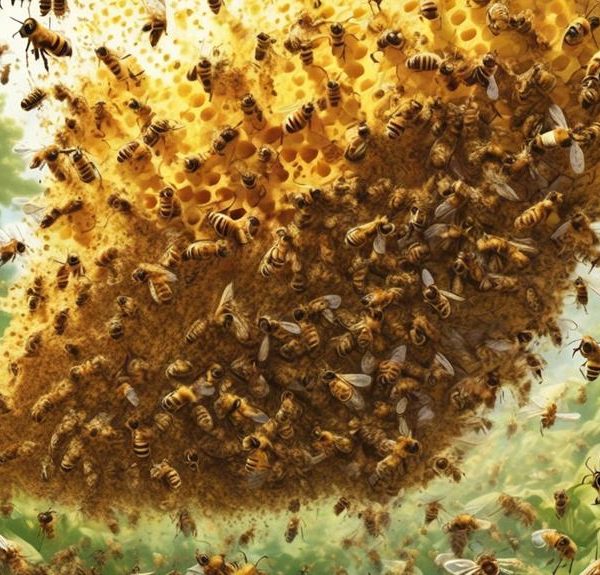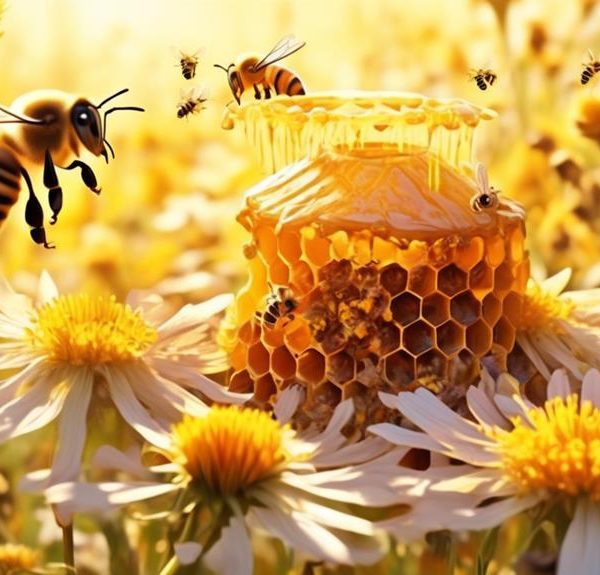Yearning to know why a bee keeps following you? Dive into the enchanting world of bee behavior and uncover the truth lurking behind their persistent pursuit.
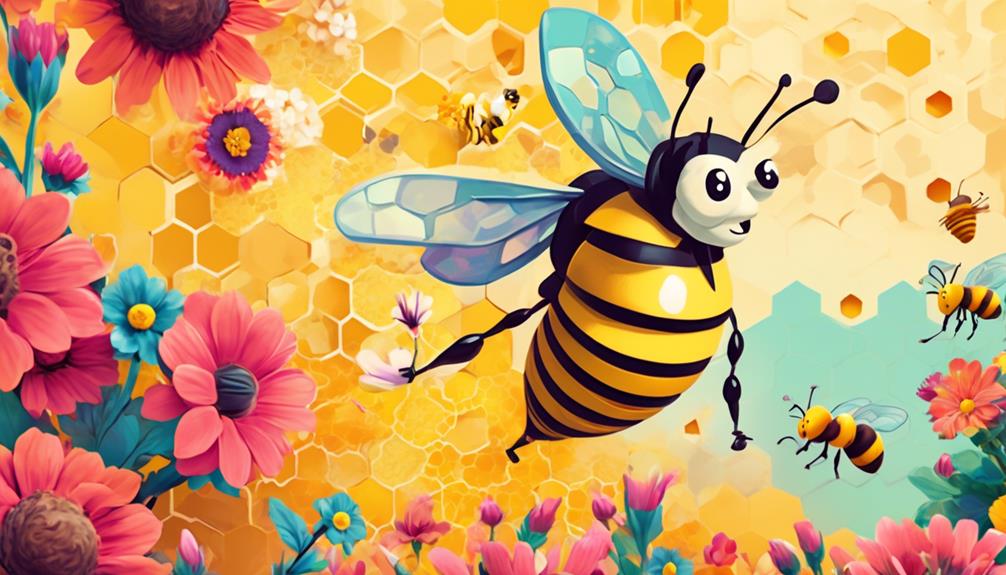
Why Does a Bee Keep Following Me?
Much like a shadow that persistently clings to your every step under the bright midday sun, you've likely noticed a bee seemingly attached to your presence, refusing to leave you alone. You might be wondering, 'Why does this bee keep following me?' Is it your perfume or perhaps the color of your clothing? Or is there something more to this unusual behavior?
As we venture into the fascinating world of bees and their intriguing behavioral patterns, you'll discover there's much more to these little buzzing creatures than meets the eye. So let's take a step into their world, shall we?
Key Takeaways
- Bees are attracted to sweet smells and can mistake humans for flowers due to their sense of smell and bright, floral patterns on clothing.
- Certain behaviors like swatting at bees can provoke them and make them more likely to follow or sting.
- Wearing neutral shades and avoiding bright colors and floral patterns in clothing can reduce bee attraction.
- Bees are essential for the ecosystem, as they are the world's most significant pollinators and contribute to biodiversity and the balance of the natural environment.
Understanding Bee Behavior
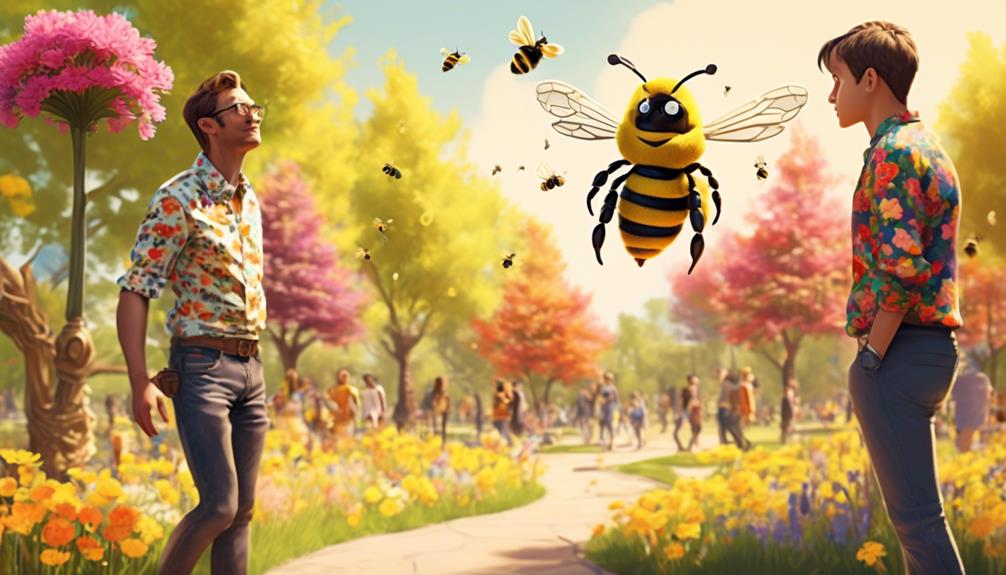
To truly grasp why a bee might be tailing you, it's critical to delve into the fascinating world of bee behavior, which is rich in complex communication systems and distinct survival mechanisms. Bees aren't merely buzzing around aimlessly; each movement has purpose and intention. You're not singled out without reason; they're drawn to you because of certain triggers.
First, it's the scent that catches their attention. Bees are guided by their sense of smell. Sweet-smelling perfumes, lotions, or even your natural body odor could attract bees.
Secondly, it's your clothing. Bright, floral patterns can confuse bees into thinking you're a giant flower full of nectar.
On a deeper level, bees are social insects with a hive mentality. Their world revolves around their queen and the survival of their colony. If they perceive you as a threat to their hive, they might follow or even attack you.
Understanding bee behavior doesn't just demystify their actions, it also provides insights into how to coexist peacefully with these incredible creatures. It's not about fear, but about respect and understanding. They've their reasons, and you have your part to play.
Factors Attracting Bees
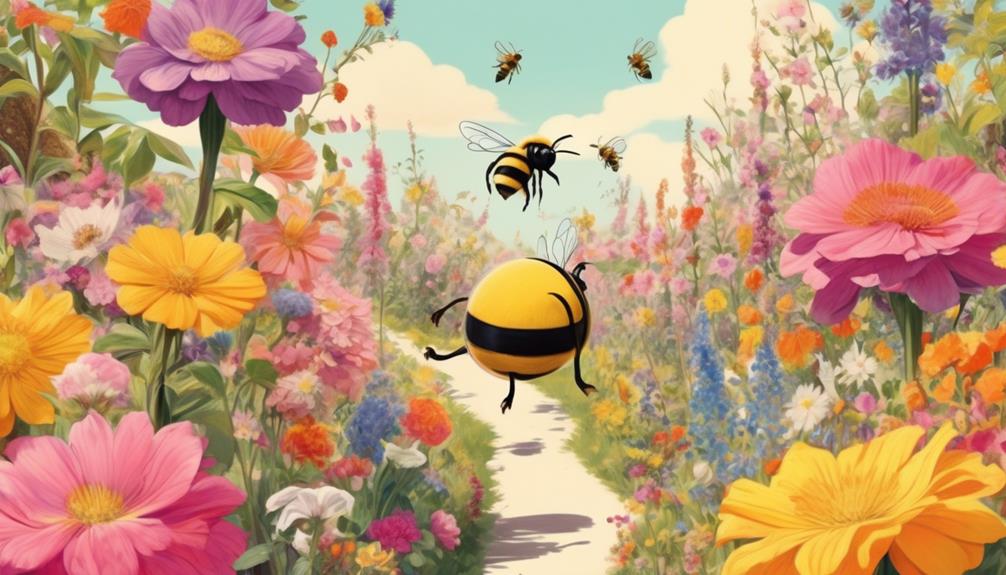
Often, you're not even aware of the factors that make you an irresistible attraction to bees. These factors are diverse and may vary from your choice of clothing to the scents you wear.
Bright colors and floral patterns on your clothes can make bees mistake you for a flower. They're attracted to these patterns because they indicate a potential source of nectar. If you're out and about in a garden or park, it's better to wear light-colored, solid clothing to deter these buzzing creatures.
Scents, particularly floral or sweet ones, can also draw bees to you. These insects have an acute sense of smell and can detect these fragrances from a distance. Even your shampoo, body lotion, or laundry detergent's smell can attract them. Avoiding strong scents can reduce your attractiveness to bees.
Certain behaviors can also make you a bee magnet. Rapid movements, such as swatting at a bee, can provoke them. Bees perceive these motions as threats, making them more likely to follow or even sting you. Staying calm and moving slowly can prevent you from catching their attention.
Common Misconceptions About Bees
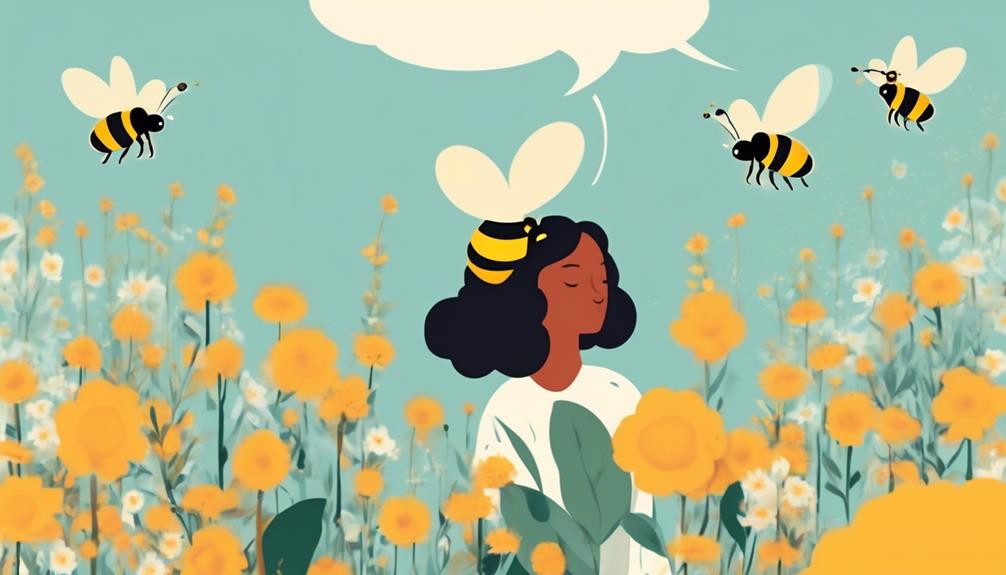
While understanding what attracts bees is essential, it's equally important to debunk some of the common misconceptions about these buzzing insects that often lead to unnecessary fear and mishandling.
First, not all bees are aggressive. You might believe that every bee you encounter is ready to sting, but that's not accurate. Most bees are docile creatures, and they'll only sting when they feel threatened. So, if you're calm and not flailing about, there's a good chance they won't bother with you.
Second, bees aren't out to get you. They're not following you because they want to attack; they're simply curious, attracted to your scent, or they might mistake your brightly colored clothing for flowers.
Third, not all bees make honey. Yes, honeybees do, but other species, like solitary and bumble bees, do not. Each species has a unique role in our ecosystem, and not all revolve around honey production.
Lastly, bees aren't pests. They're integral to our environment, pollinating plants and contributing to biodiversity. Killing bees out of fear isn't just unnecessary; it's harmful to our planet. Understanding these facts can alleviate your fear and lead to better bee-human coexistence.
How to Discourage Bee Attention
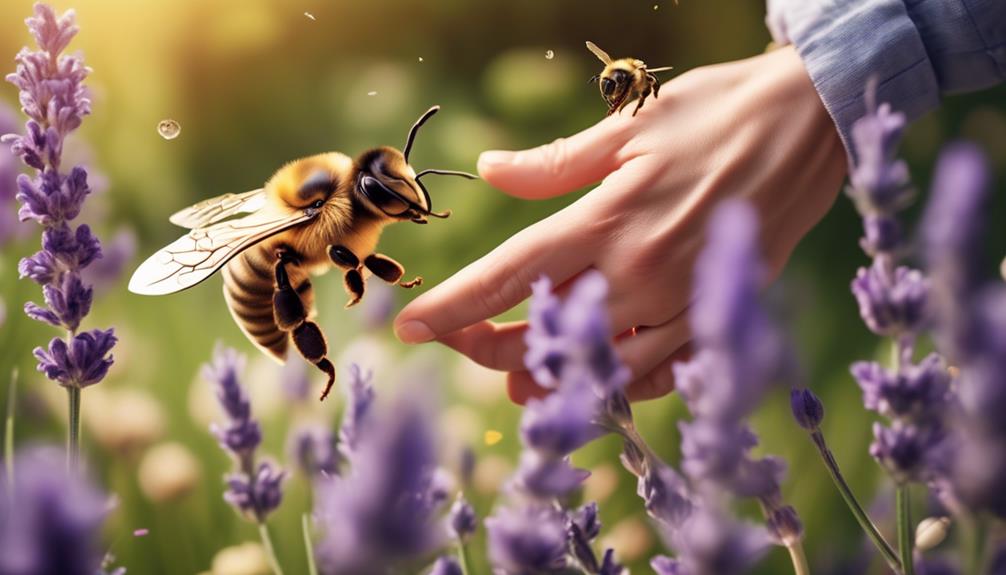
Despite your newfound respect for bees, you might still want to avoid being a bee magnet, and there are several proven strategies that can help keep these buzzing creatures at a distance.
First, consider your wardrobe. Bees are attracted to bright colors and floral patterns, so opt for neutral shades. Avoid wearing perfumes or scented lotions as these can mimic the scent of flowers and draw bees in.
Next, be mindful of your food and drinks outdoors. Sweet foods and drinks can attract bees, so keep them covered until you're ready to consume them. Also, quickly clean up any spills, particularly sugary ones.
Lastly, if a bee does approach you, resist the urge to swat at it. This will only agitate the bee and increase the likelihood of a sting. Instead, stay calm and slowly move away. Bees are more interested in flowers than people, and if you don't pose a threat, they're likely to lose interest.
It's not foolproof, but these steps can reduce your chances of attracting bees. Remember, they're essential for a healthy ecosystem, so a little coexistence goes a long way.
Importance of Bees in Ecosystem
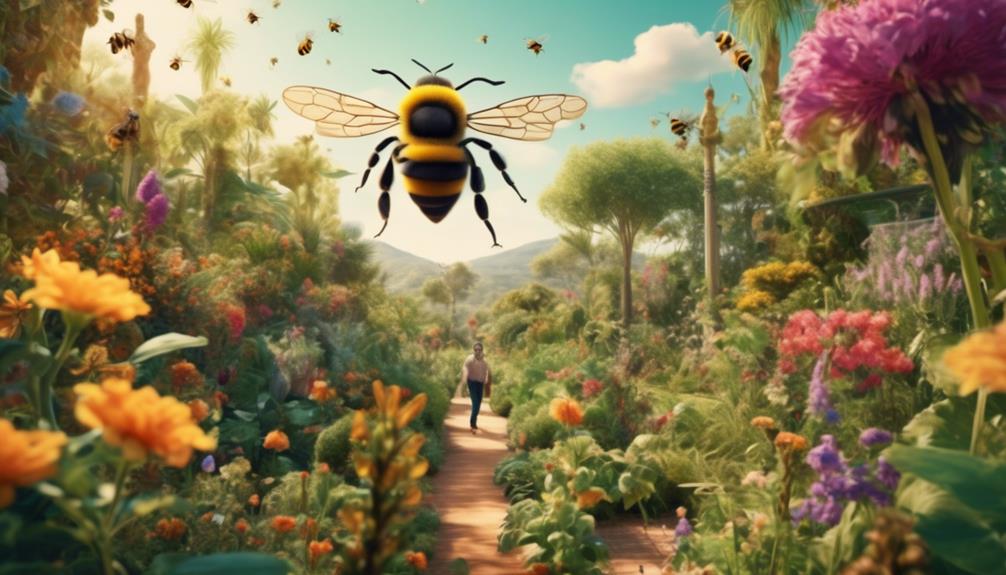
Although you might find bees a nuisance at times, it's crucial to understand their irreplaceable role in our ecosystem. Bees are the world's most significant pollinators, contributing to the growth of fruits, vegetables, and nuts that form a large part of our diets. Without bees, our food system would drastically collapse, leading to a worldwide crisis.
Bees also play a vital role in maintaining the balance of the ecosystem. They help in the reproduction of various plants by transferring pollen between flowers. This process, known as cross-pollination, is essential for the survival of many plant species. When bees disappear, these plants can't reproduce and may eventually become extinct, disrupting the natural balance of our environment.
Furthermore, bees contribute to biodiversity. This might sound complex, but it's simply about the variety of life in a particular habitat. Greater biodiversity means more resilience to changes in the environment. Without bees, our ecosystems would become less diverse, making them more vulnerable to threats like disease, climate change, and human activities.
Frequently Asked Questions
What Happens if a Bee Stings Me?
If a bee stings you, your body's natural response is to swell and redden at the sting site. You'll likely feel immediate, sharp pain followed by dull ache.
It's important to remove the stinger as soon as possible to prevent more venom from entering your body. Most people have mild reactions, but if you're allergic, you might experience severe symptoms like difficulty breathing.
If that happens, seek immediate medical help.
How Can I Treat a Bee Sting at Home?
You've got a bee sting, huh? Don't worry, you can treat it at home.
Firstly, remove the stinger by scraping it out, don't squeeze it.
Clean the area with soap and water.
Apply a cold pack to reduce swelling.
Use a topical cream to alleviate pain and itching.
Consider taking an antihistamine if it's causing discomfort.
And remember, if you're feeling any severe symptoms like difficulty breathing, seek medical help immediately.
Can Bees Remember Human Faces?
Yes, bees can remember human faces! They're not just tiny flying machines, they're also quite smart. Scientists have discovered that honeybees can learn and recognize human faces, which is a very complex cognitive ability.
They use a process called configural processing, which involves perceiving the face as a whole rather than individual parts.
What Are the Differences Between Bees, Wasps, and Hornets?
You're wondering about the differences between bees, wasps, and hornets.
Well, bees are generally furry, feed on nectar and pollen, and are essential for pollination.
Wasps, on the other hand, have slender bodies with a narrow waist and are predators.
Hornets, a type of wasp, are larger and can be more aggressive.
They're all part of the Hymenoptera order, but their behaviors and roles in nature vary greatly.
What Is the Average Lifespan of a Bee?
You're probably wondering about the average lifespan of a bee. Well, it varies between species and roles within the colony.
Worker bees typically live for 5-6 weeks during summer, while drones, or male bees, live around 8 weeks.
The queen bee, however, can live up to 5 years. Her longevity is due to her diet of royal jelly, a substance worker bees produce.
Conclusion
In conclusion, bees aren't out to get you. They're likely attracted by your clothing, scent, or even the sweet drink you're holding. While it can be unnerving, remember they're crucial to our ecosystem. Instead of panicking, try changing your clothes or moving away gently.
Understanding and respecting their role in our environment can lead to more harmonious interactions with these buzzing creatures. So next time a bee buzzes by, don't fret, it's just doing its job.

